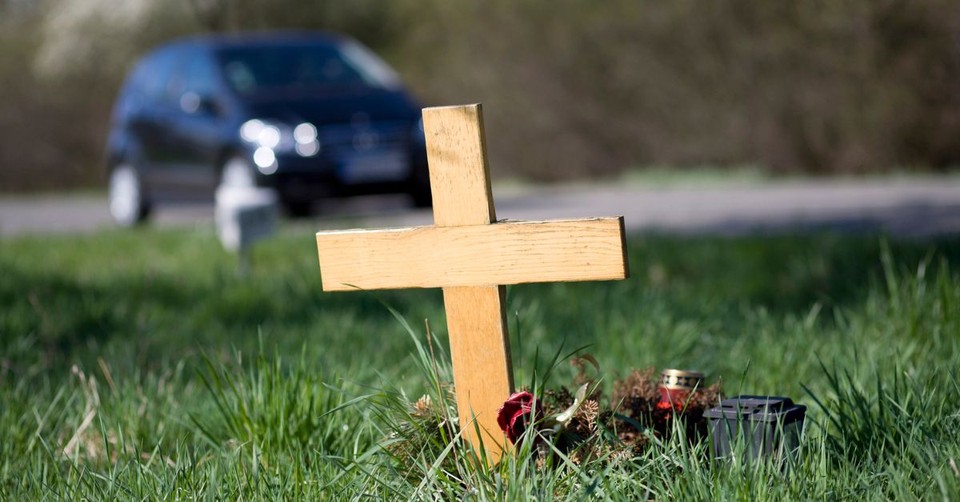Tragic Accident Leads to Powerful Message of Faith and Ministry

One Saturday night years ago, just as we were beginning the first of our weekend services, a tragic car accident happened in front of our church’s main entrance. A 35-year-old man accidentally crossed the median line and ran into a car coming in the opposite direction. He wasn’t wearing a seatbelt and was thrown from his car. He died on the scene. The “scene” being the side of the road by our front sign. Members and staff from our church were the first by his side. No one knew who he was.
It goes without saying that a death of any kind is unsettling. But death in front of a church brings everything about our lives and mission into a unique focus.
That night, as I drove from our campus, I could only think, Was he a Christ follower? Did anyone ever reach out to him? What comfort is there in his family right now?
I was told there was a child’s safety seat in the back of his truck. Was he a father? I could not shake the depth of that human tragedy—and the consequences. Not just in regard to the immediate throes of grief that would descend upon all who knew him but also the consequences of his death for eternity.
I took it upon myself to find out who he was. His name was John. He had a young wife and a 22-month-old daughter. I called the pastor of the church who was doing the funeral. It was a little Baptist church not far from our own. I learned that the entire church was in a state of shock and that they took the following Sunday to try to process his death together as a family of faith.
Their one consolation? They knew he was a Christian. John was a Sunday school teacher and deeply committed to his faith. And while I was still aware of the enormous pain that surrounded his death, inside, I whispered a prayer of gratitude.
There were heroes around John’s death that Saturday. Some of them were members of my church, along with medics, firefighters, and police officers—all doing all that they could to save a life. And it was so clear what needed to be done. It was so obviously urgent.
But in truth, the real saving had already been done because another group of people saw the urgency surrounding his life in another way. The real heroes were the people who saved John before he died. And the best response of our church was not to run up the hill to serve at the scene of an accident but rather to reach out to the thousands who drive by our campus in their cars every day. For each one will, in their own way and time, meet an equally fateful end.
Yet it is precisely this challenge that seems to have fallen on deaf ears. It would seem that we have confused the command to not be of the world with not being in it—particularly in terms of relationships with those who do not share our faith. We are often isolated from the very people we say we long to reach, having seemingly retreated into a subculture of our own making.
This was not the model of Jesus.
He went into the world; He spent time with those who were far apart from God. He reached out relationally, built friendships, went into their homes, attended their parties, broke bread at their tables. It was profoundly intentional and openly risqué, to such a degree that He was derisively called a “friend of sinners.”
The scandal of Jesus’ interaction with the unchurched is often lost on modern readers of the Gospels. So he went to a party of Matthew’s? So he ate with Zacchaeus? So he spoke to a woman at a well? He was just being courteous, akin to someone who would open the door for a young mother or help an elderly person across the street. Such matters are passed over quickly to get to the heart of the story.
But attending Matthew’s party, eating with Zacchaeus and speaking to the woman is the story. In the ancient world, “table fellowship” was considered an act of intimacy—arguably among the closest of intimacies. This helps explain the depth of betrayal David felt when he spoke of those with whom he had shared bread but then turned against him (Psalm 41), as well as the pain Jesus felt when Judas—immediately after taking the bread from his hand—went out into the night for his 30 pieces of silver.
To eat with someone, particularly a “sinner,” was far more than a meal. It signified welcome, recognition, and acceptance. Eating with sinners simply was not to be done—not even in the name of redemption: “Let not a man associate with the wicked, even to bring him near to the law,” went the later rabbinic saying. This is why we read of the shock and dismay that Jesus was virtually indiscriminate with whom He ate (Luke 14–15). But He was more than just willing to meet and speak with those far from God. He was passionately intentional, proclaiming that such interactions rested at the heart of His mission:
“Who needs a doctor: the healthy or the sick? I’m here inviting outsiders, not insiders—an invitation to a changed life, changed inside and out.” (Luke 5:31-32, MSG)
“[I] came to seek and to save the lost.” (Luke 19:10, NIV)
“Go out to the roads and country lanes, and urge the people there to come so my house will be full.” (Luke 14:23, NCV)
Mecklenburg Community Church has more than 70% of its total growth coming from the unchurched. Leaders from other churches often ask what we do to reach such large numbers of non-Christians. They want a program, a style, a series… anything that might translate to their context and work.
The reality is that our strategy is constantly changing. Our “secret,” however, has remained the same for more than three decades: we are committed to reaching out in the most effective way possible.
It’s that simple.
We do not believe we exist for ourselves but rather for those who have yet to come. We do not build the church to meet our needs but rather the needs of others. Our “front door” has been intentionally, passionately, thrown open, and we do not simply invite others in…
... but actively seek them out and bring them.
James Emery White
Sources
Adapted from James Emery White, Christ Among the Dragons, get the eBook HERE.
Photo Courtesy: ©Getty Images/ollo
Publish Date: July 18, 2024
James Emery White is the founding and senior pastor of Mecklenburg Community Church in Charlotte, NC, and a former professor of theology and culture at Gordon-Conwell Theological Seminary, where he also served as their fourth president. His latest book, Hybrid Church: Rethinking the Church for a Post-Christian Digital Age, is now available on Amazon or from your favorite bookseller. To enjoy a free subscription to the Church & Culture blog, visit churchandculture.org where you can view past blogs in our archive, read the latest church and culture news from around the world, and listen to the Church & Culture Podcast. Follow Dr. White on X, Facebook, and Instagram at @JamesEmeryWhite.
Originally published July 18, 2024.







